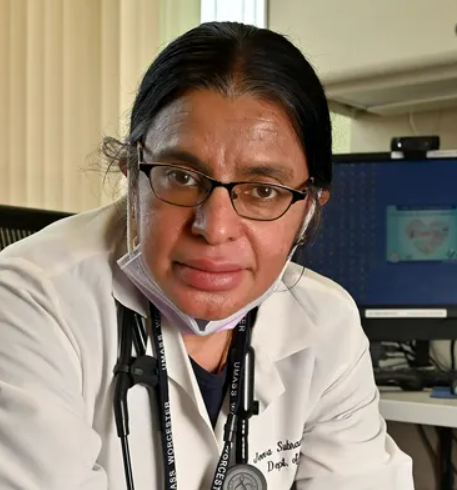 When Jeeva Subramanian came to the United States to begin her residency at Michigan State University Medical School, she planned on becoming a pathologist, but after only six months of training, she realized that she could not pursue a career path where she would not be able to see and directly care for patients. Fortunately, there was an opening in the Internal Medicine Residency program at Michigan State, and she was able to make the switch to pursue medicine. It turns out that her instincts as a young resident served her exceedingly well. After a career of over two decades in medicine, she remains dedicated to caring for her patients and helping them identify strategies to improve their health and well-being.
When Jeeva Subramanian came to the United States to begin her residency at Michigan State University Medical School, she planned on becoming a pathologist, but after only six months of training, she realized that she could not pursue a career path where she would not be able to see and directly care for patients. Fortunately, there was an opening in the Internal Medicine Residency program at Michigan State, and she was able to make the switch to pursue medicine. It turns out that her instincts as a young resident served her exceedingly well. After a career of over two decades in medicine, she remains dedicated to caring for her patients and helping them identify strategies to improve their health and well-being.
In this month’s spotlight, we highlight the work of Jeeva Subramanian, MD, an associate professor of medicine and physician in General Internal Medicine. Dr. Subramanian has worked in both inpatient and ambulatory settings throughout her career, but her passion lies in ambulatory medicine. In the clinic, she sees many patients with chronic medical issues where obesity is the cause or a contributing factor. She is certified in obesity medicine and a primary focus of her clinical practice is obesity. She is currently an investigator on a UMass Chan Ambulatory Research Consortium (ARC) pilot project, Digital Medicine in Primary Care: Implementation of Remote Activity Tracking to Promote Healthy Weight Management. Along with co-investigators, Drs. Steven Erban (Medicine), Nina Rosano (Medicine), Jamie Faro (Population and Quantitative Health Sciences), and Varun Ayyaswami, an internal medicine resident, Dr. Subramanian is studying how data from wearable devices, such as Fitbit, can be directly integrated into the electronic health record (EHR) in a functional and practical way so that providers can work with patients to set goals and utilize these devices as part of their weight management. The hope is that with the data transmitted to the EHR, providers will review and discuss strategies to help set physical activity and weight management goals for their patients. In addition to her work with obesity and weight management, she has previously led quality improvement projects on opioid prescribing and management including one on peer support for improved opioid prescribing in primary care, in which she also received funding support through the UMass Chan Carl Akins Risk Management Grant Program.
Dr. Subramanian has been an educator throughout her entire career. She finds her work with students and residents to be highly rewarding and, importantly, believes reciprocal learning between the teacher and student is essential. “[Being an educator] is extremely important to me. The main reasons for that are my students teach me a lot and it makes me feel younger when I am with them”, said Dr. Subramanian. She is currently the associate program director for ambulatory training in the Internal Medicine Residency. While the role is relatively new for her having started in the Fall of 2022, her hope is that ambulatory training will bring more interest to primary care and more residents will go on to pursue careers in primary care. In addition to her work as associate program director, she currently teaches within the Primary Care Track of the Internal Medicine Residency.
Dr. Subramanian earned her MBBS at Coimbatore Medical College in Coimbatore, Tamil Nadu, India. She completed her Internal Medicine Residency at Michigan State University Medical School. After she completed her training, she was an internist at Spectrum Health in Grand Rapids, Michigan, and held an academic appointment at Michigan State University Medical School, where she served as associate program director of the Internal Medical Residency Program and director of the Resident Continuity Ambulatory Clinic. She joined as a faculty and physician at UMass Chan Medical School/UMass Memorial Health in 2017.
Dr. Subramanian moved to Massachusetts to be closer to her daughter when she was pursuing her collegiate studies. Now that her daughter has graduated and left the area, she has settled here, continues to enjoy the beauty of New England, and finds her work at UMass meaningful. She appreciates working in a culturally diverse community and helping patients with complex medical problems. She also values being part of a team that is willing to dig in and work together. “No matter how difficult and tough the day may be, because of [my] co-workers…and the nurses and medical assistants that are [in the clinic], they make the day go by so smooth,” said Dr. Subramanian.
We are thankful to Dr. Subramanian for her commitment to the care of her patients and the education of residents and students.
